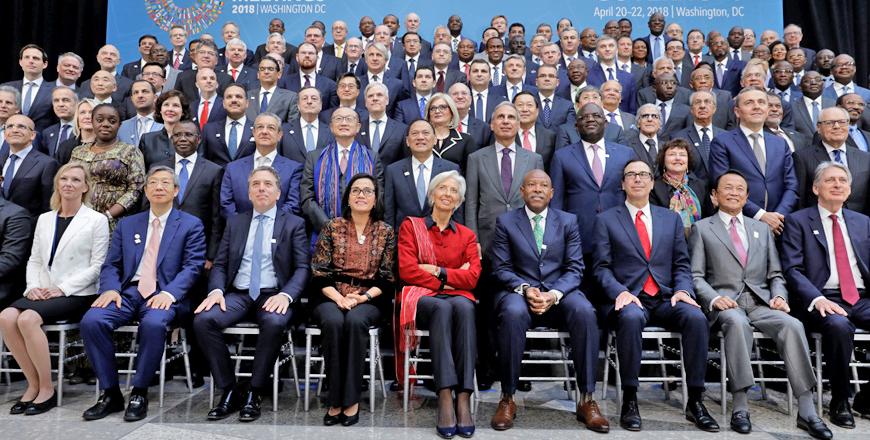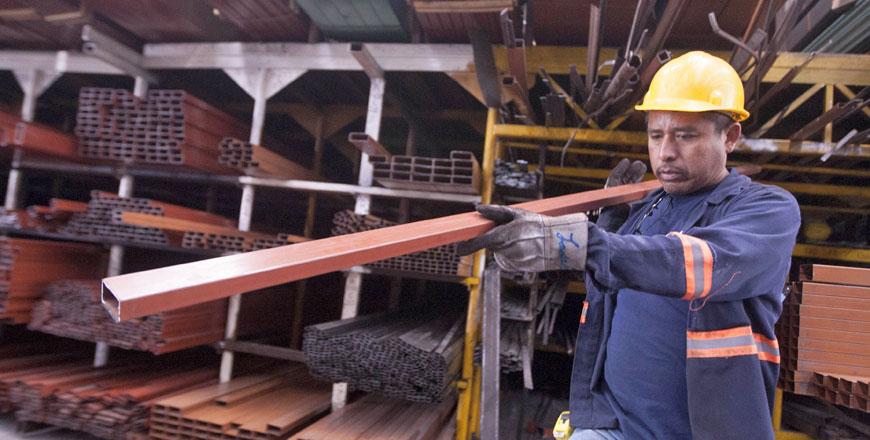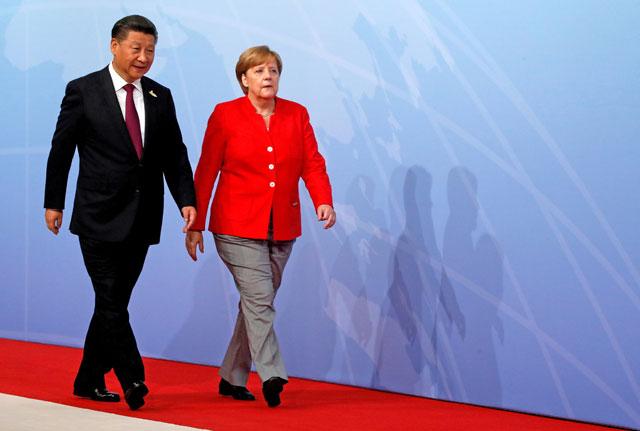You are here
US-China trade tension dominates IMF gathering
By AFP - Apr 21,2018 - Last updated at Apr 21,2018

Finance ministers and central banks governors gather for a photo during the IMF/World Bank Spring meeting in Washington, US, on Saturday (Reuters photo)
WASHINGTON — Trade tensions between the United States and China, which threaten to spill over into the global economy, are dominating a gathering of world finance officials even as the Group of 20 (G-20) avoided the topic on Friday.
Official after official has called for disputes to be resolved through dialogue rather than unilateral tariffs, and warned about the threat to the economic recovery.
French Economy Minister Bruno Le Maire criticised what he called a "vain and pointless" spat with China.
"We run the risk of trade war. We run the risk of multilateral order breaking down that is good for no one, and most definitely not for the world economy and growth," Le Maire told reporters during the Spring meetings of the International Monetary Fund (IMF).
But US President Donald Trump's top finance official said the fault lies with countries that employ unfair trade policies.
"We strongly believe that unfair global trade practices impede stronger US and global growth, acting as a persistent drag on the global economy," US Treasury Secretary Steven Mnuchin said in a statement to the IMF.
While IMF chief Christine Lagarde has offered the fund as a forum to resolve differences, Mnuchin instead said the IMF "should be a strong voice" in urging members "to dismantle trade and non-tariff barriers and to protect intellectual property rights".
Le Maire agreed China must respect the rules, but said the country is a key part of the world trading system.
"We must redefine international trade with China, not against China."
Theft of American intellectual property and technology has been a key irritant in the dispute with Beijing, which prompted President Donald Trump to announce steep tariffs on tens of billions of dollars' worth of Chinese goods, on top of last month's punitive duties on steel that were primarily targeted at China as well.
Washington and Beijing have traded tariff threats and also filed complaints against each other at the World Trade Organisation (WTO).
WTO Director Roberto Azevedo warned that the effects of a major escalation "could be serious", and poor countries would be the collateral damage.
"A breakdown in trade relations among major players could derail the recovery that we have seen in recent years, threatening the ongoing economic expansion and putting many jobs at risk," he said in a statement to the meetings.
The IMF has highlighted the trade tensions as a major downside risk to the otherwise solid global recovery, and Lagarde said the dispute undermines confidence and creates uncertainty that could choke off investment which has been a prime engine of the global recovery.
The WTO projects global merchandise trade will expand by 4.4 per cent this year, after increasing by 4.7 per cent in 2017.
Despite the intense focus on the US-China dispute, the G-20 finance ministers, from the world's major economies, avoided discussion of the issue on Friday, even while acknowledging the potential danger it posed to the global economy.
"We didn't have a discussion on specific measures on trade," Argentine Treasury Minister Nicolas Dujovne told reporters after the meeting. "The G-20 is not the place to discuss specific measures. That's the WTO."
It was a surprising omission for the group that was key to shepherding the global economy through the 2008 financial crisis and preventing another depression.
But Dujovne said, "We have to also recognise the limitations that we as a group have... and try to find a consensus even if the consensus is more limited than we want."
The ministers did express concern over the growth of "inward looking policies", he said, using a frequent euphemism for trade protectionism.
But German central bank chief Jens Weidmann said the G-20 officials all agreed trade must benefit all countries.
"Protectionism, not to mention a trade war, is certainly not the solution."
Le Maire repeated his criticism of the US tariffs on steel and aluminum which were aimed at China but only spared the EU and other key trading partners under a temporary exemption that is due to expire May 1.
As close allies in the EU "we expect not only temporary exemption but a full and permanent exemption", he said.
"We cannot live with a kind of sword of Damocles hanging over our heads."
Related Articles
WHISTLER, Canada — The EU on Friday launched its first counteroffensive against Washington's punishing steel and aluminum tariffs while the
MAR DEL PLATA — Trade and investment ministers from G-20 countries meeting in Argentina said there was an "urgent need" to improve the World
BERLIN — German Chancellor Angela Merkel and Chinese President Xi Jinping discussed overcapacity in world steel markets and agreed on Saturd



















